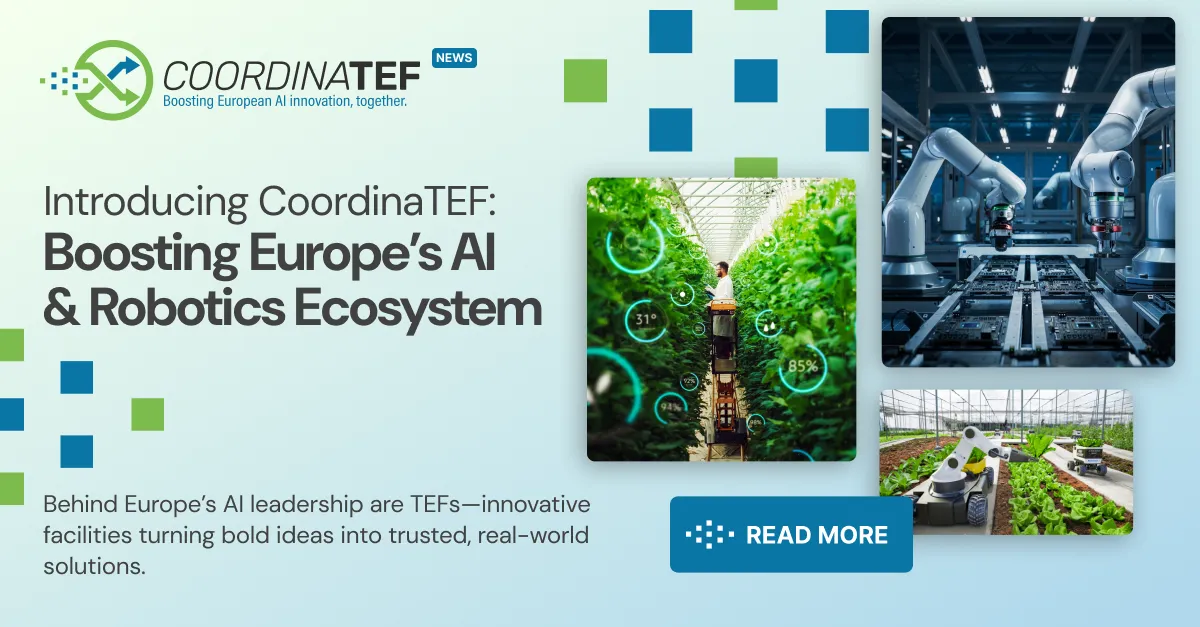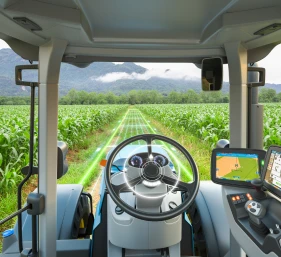The European Commission has officially launched four Testing and Experimentation Facilities (TEFs) under its digital strategy, marking a significant step towards enhancing the development and adoption of trustworthy Artificial Intelligence (AI) and Robotics across key sectors. These TEFs serve as large-scale, open environments where new AI-based technologies can be tested, validated, and deployed in real-world conditions.
These facilities are part of the broader European effort to support innovation while ensuring compliance with EU values, legislation, and strategic goals. Their establishment is a core component of the European strategy for digital sovereignty, and each TEF addresses the specific needs and opportunities of a distinct sector. This is where CoordinaTEF comes in and acts as enabler for these facilities to operate within a coherent and collaborative framework.
Key Sector Coverage: Europe’s Four TEFs
agrifoodTEF focuses on the agri-food sector, providing infrastructure and support for AI applications that improve productivity, sustainability, and safety in agriculture and food systems.
TEF-Health is dedicated to the healthcare sector, offering a trusted and secure testing environment for AI solutions in clinical and medical settings. It aims to support the development of technologies that comply with EU regulatory frameworks and meet the highest standards of patient safety and ethical responsibility.
AI-MATTERS addresses the needs of the manufacturing sector by enabling experimentation with AI-driven automation, robotics, and smart industrial processes. The goal is to enhance the competitiveness of European manufacturing by accelerating digital transformation.
Citcom.AI supports the deployment of AI in smart cities and communities. This TEF is designed to facilitate experimentation with technologies in areas such as mobility, energy, urban management, and public services, with a focus on societal trust and inclusion.
These TEFs not only provide access to advanced technical infrastructure, but also offer regulatory guidance, sector-specific expertise, and opportunities for collaboration with public and private stakeholders.
The Role of CoordinaTEF
CoordinaTEF plays a central role in ensuring these facilities operate within a coherent and collaborative framework. As a coordination and support action (CSA), CoordinaTEF promotes knowledge sharing, and supports the development of joint strategies for long-term sustainability.
The project also facilitates engagement with relevant national and European institutions, ensuring TEFs remain closely integrated with the broader AI ecosystem. Through the establishment of coordination mechanisms, CoordinaTEF aims to maximise efficiency, and ensure the overall impact of TEFs is amplified across Europe.
Furthermore, CoordinaTEF supports the alignment of TEFs with EU digital policies, including the AI Act and other regulatory frameworks. It also fosters links with related initiatives such as European Digital Innovation Hubs (EDIHs), national competence centres, and the AI-on-Demand platform.
As the TEFs amplify their operation and the first phases of testing and experimentation are underway, CoordinaTEF will provide guidance, and communication support, helping to build a robust and interconnected European TEF ecosystem.
This collective effort led by Intellera, imec, Fondazione Bruno Kessler, Adra Association, CEA, Trust-IT Services, COMMpla and Charité – Universitätsmedizin Berlin is expected to significantly contribute to Europe’s competitiveness in AI and robotics, while promoting trust, safety, and innovation.

